Ten must-listen Kashmiri-language songs purely for the lyrics.
Obsessed with Kashmiri tunes and melodies? Did you know? Kashmiri, a Dardic language, takes a unique path away from the usual Indo-Aryan flow. Personally, what intrigues me is the blend of Sanskrit and Farsi, a reflection of the region’s rich history. While it is easier to identify the Farsi references in Kashmiri, given its recent history, it is tough but possible to identify the Sanskrit blends if you understand even a bit of the language.
I came across Kashmiri songs while researching the mystics of India a long time ago. Lall Ded, that 14th-century mystic, led me to the top track on my list — “Hukus Bukus”. Although the songs I’m about to share are from the popular realm of Kashmiri music, there’s merit in sharing them, as it could serve to attract youngsters to the rich music of this region.
Below I am sharing my top Kashmiri tracks and snippets from them. For each snippet, I added language annotations, for instance, for the word Golaab (F. for Rose), meaning the word Golaab originates in Farsi. I follow a similar pattern for Sanskrit words by replacing F. with S.
DISCLAIMER: All the images in this post are used for educational purposes, and their rights remain with the original creators. Each image has its source mentioned.
Hukus Bukus — Aabha Hanjura

Hukus Bukus, the delightful children’s poem, has an intriguing history! Originally penned by the Kashmiri Shaivite mystic Laal Ded (1320–1392), it’s a beautiful blend of art and spirituality. While on my quest to explore Lal Ded’s enlightening Vakhs, I stumbled upon this hidden gem! Listen to Aabha Hanjura’s song version of this Vakh here. If you would like to explore other versions, there are ones from Shaan, Sumit Kaul, and Ishtiyak Maqbool.
As the verses are written in 14th century, the influence of Farsi is minimal to none and Sanskrit words appear frequently. Check out part of the verse and its translation (source) below. Though the source mentions “poyun” as water in Sanskrit, I am a bit confused on whether it could be that way. If you have more information on it, do elaborate in the comment.
Tse Kus Be Kus Teli Wan su Kus
Who are you and who am I, then tell us who is he the creator that permeates through both you and IMoh (S. for Worldly attachment…) Batuk Logum Deg
Each day I feed my senses/body with the food of worldly attachment and material loveShwas (S. for Breath) Khich Khich Wang-mayam
For when the breath that I take in reaches the point of complete purificationBhruman (S. for Nerve center in the human brain) daras Poyun (S. for water) chokum
It feels like my mind is bathing in the water of divine loveTekis Takya bane Tyuk (S. for Tika pasted on forehead).
Then I know I am like that sandal wood which is pasted for divine fragrance symbolic of universal divinity. I realize that I am, indeed, divine
2. Kya Karie Koriemol — Alif, Noor Mohammad & Aashima Mahajan
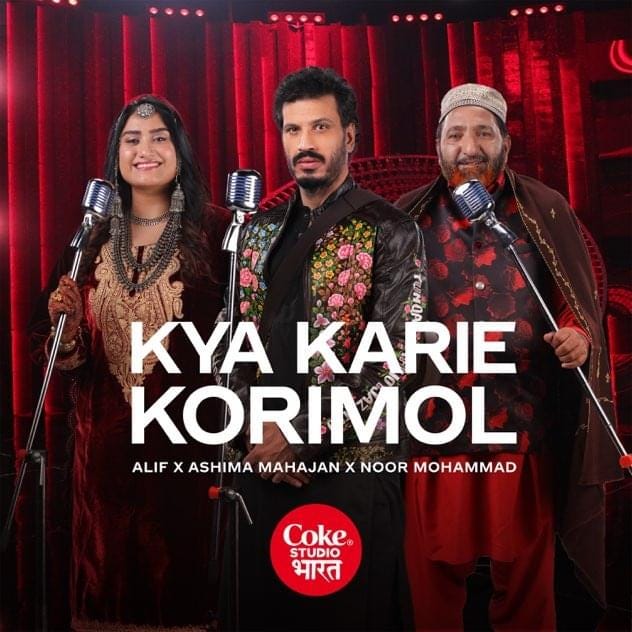
Mind blown by Coke Studio Bhaarat! Just when I doubted their mixing capabilities, they dropped “Kya karie korimol.” This Kashmiri gem beautifully captures a father’s emotions as he marries off his daughter. And that “Wanwun” moment? Goosebumps galore!
Carefully consider the word “Zamach”* in part of the lyrics. It’s possible that the word “Zamach” in the context mentioned could be related to the word “जन्म” (janma) in Sanskrit, which means “birth” or “being born.” The usage described, where the wanvun talks about “…being born out of the communion of the sun and moon…” could be a metaphorical reference to the idea of birth or creation. However, since language and its nuances can vary, it’s important to consider that “Zamach” might also be a specific term or expression used in the Kashmiri language that carries a unique meaning in that context.
Zan Chhakav Zunee Aphtaabas (F. for Moon) zamach* (S. To be born)
As if you are born out of the communion of moon and sunZan Chhakav Noor (F. for Light) Pyath Pede Gamach
As if you have emerged from the divine lightDekas Chhooee Tika (S. for Tika/Mark on forehead) Taee Nastee (S. for Nose) Chhaee Chunee
Your forehead flaunts a harness, your nose a crystal stud
3. Choan Rukh posh X Hukus Bukus — Waqar Khan & Rishab Raino
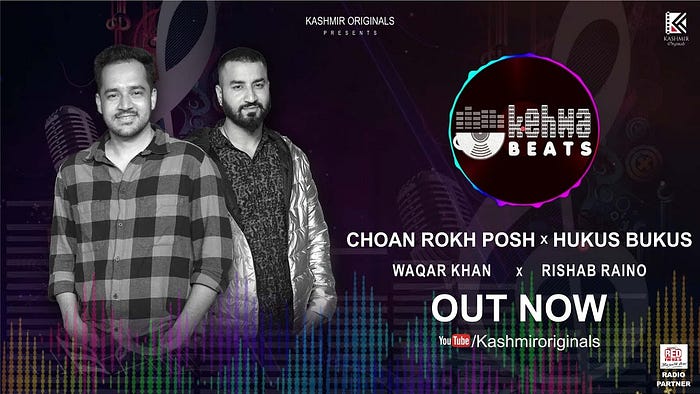
Bringing you the essence of Kashmir through homegrown talent! Kashmir Originals, a local initiative, gathers voices from Jammu and Kashmir. 🎶 Every track is a treasure, but there’s one that’s got me hooked — a blend of Choan rokh posh and Hukus Bukus, merging old Kashmiri Vakh and new folk vibes. Shoutout to Rishab Raino and Waqar Khan for this musical masterpiece! I would suggest listening to all the songs from Kashmir Originals.
Choun Rokh (F. for Face)Poshwun Gulab (F. for Rose ) Chuna (S. for is it not?)
Your face is a rose in bloom, is it not?Gulshanan (F. for Gardens) manz su intikhaab (F. for choice) Chuna (S. for is it not?)
Chosen one among gardens, is it not?Mayen drih chay dyakas grih mutchraav
i beg you, unwind sad lines of your foreheadyoot chashmn (F. for Eyes) andar tche aab (F. for Farsi) chuna (S. for is it not?)
water in your eyes has dried, has it not?
4. Naazneen — Noor Mohammad & Raj Pandit
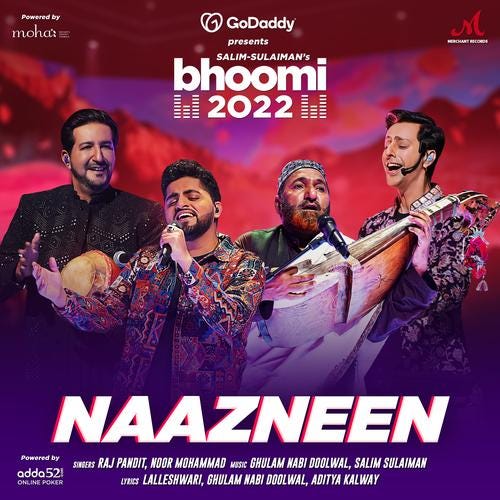
Once again, Salim-Sulaiman kept their word of showcasing Kashmiri talents. Their latest masterpiece, “Nazneen”, from the Bhoomi 2022 album, is pure gold. The music features seasoned singers like Noor Mohammad Saab, an iconic figure in Kashmiri music, while also introducing the fresh voice of Raj Pandit.
5. Roshay — Vibha Saraf & Dub Sharma
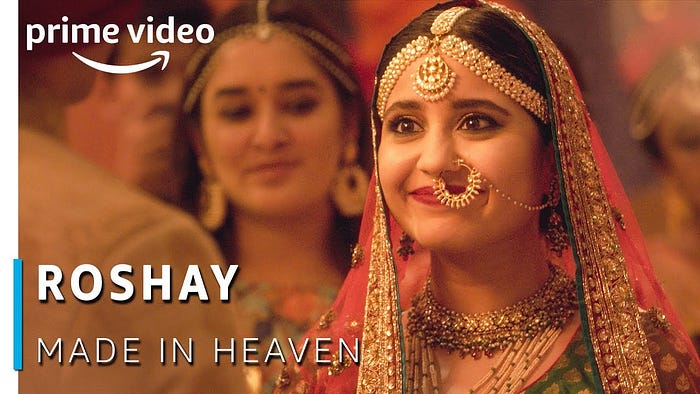
Remember that unforgettable moment from Made in Heaven (Netflix)? When the bride takes a stand and walks away from her wedding because the groom demanded a hefty dowry. As a woman, this episode truly resonated with me. And that soulful Kashmiri folk song “Roshay” playing in the background? It’s been stuck in my head for days! You might also like the version sung by Zeb Bangash and one by Ali Saffudin.
Delving into the lyrics, one can observe the captivating blend of Farsi and Sanskrit influences. Notably, the term “gasvai” which likely draws its origin from Sanskrit but has evolved to embody the essence of Dardic Kashmiri. Likewise, within the same musical composition, you can identify the term “gatchav” a reflection of the English translation “to go,” with its roots echoing the Sanskrit “ga.” It’s reminiscent of the Sanskrit word “गच्छति / gacchati,” isn’t it?
Wal Weis gaswai (S. for “To go”) ab (F. for Water) as,
Let us go, friend, to fetch waterDuniya (F. for World) neendri (S. for Sleep) te khwabas (F. for Dreaming)
While the world is still asleep and dreaming
6. Baha yaar lagai — Irfan Nabi, Bilal Matta & Mahmeet Syed
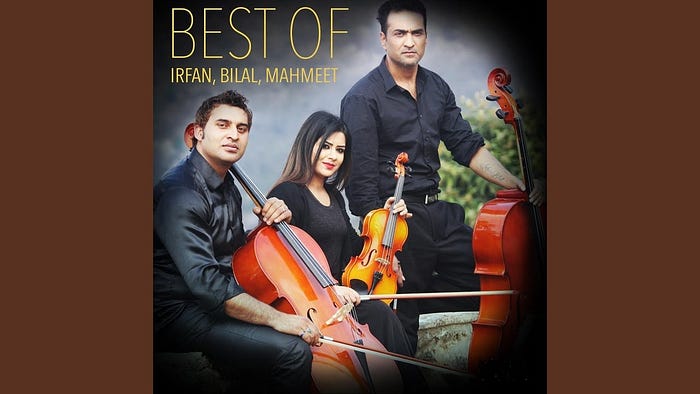
Though I came across the song Baha yaar lagai from DySP Adil Sheikh's social media profile, the version I began admiring is from Irfan Nabi and the group.
7. Maayi Chani — Ali Saffudin
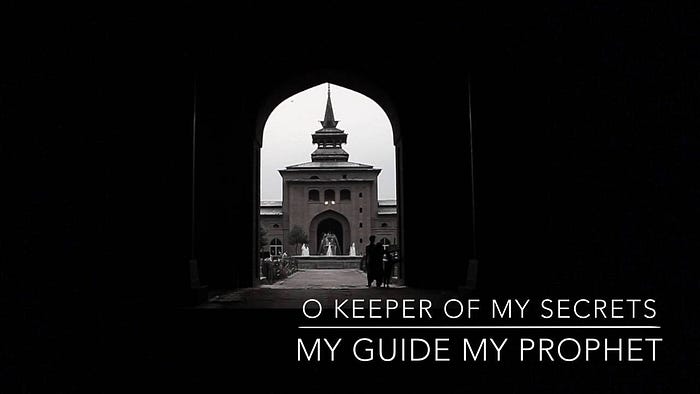
Maayi chani, originally composed by Sufi saint Nyame Saeb, Ali Saffudin’s rendition pays homage to the challenging times faced by Kashmiris. These stirring lyrics have the power to evoke tears. And don’t miss Waqar Khan’s unique version of this touching song. Consider some of the words of this song and how Sanskrit and Farsi intertwine.
Maayi Chaani ravem Mea Raat (S. for Night) Doh (S. for Day)
In your love I have lost day and nightsDariyaav (F. for river) taraan (S. for crossing) veer ba gous
While crossing the river I am stranded
8. Khanmoej Koor — Aabha Hanjoora
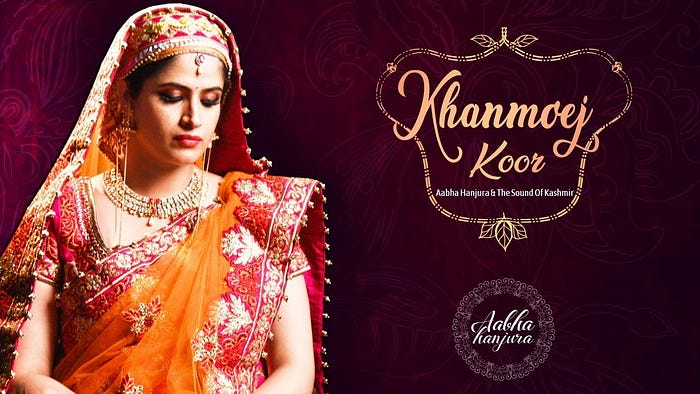
Think about a Kashmiri wedding, and you will, of course, remember this song, “Khanmoej koor”. It is absolutely essential for any Kashmiri wedding bidaai. I was introduced to this song through the song Dilbaro from the movie Raazi. It literally starts with
Buh chhassaye khanmoej koor,
I’m your dearest daughter,Dyuh meh rukhsath (F. for farewell) myane buoyjaano.”
Now it’s time to bid me farewell, O my beloved papa.”
9. Roshewalla— Aabha Hanjura
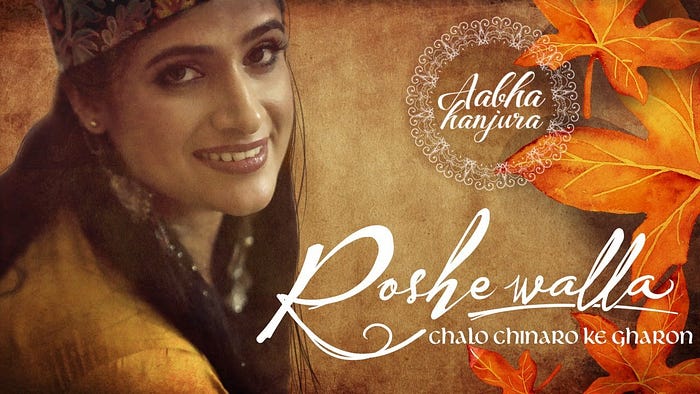
Introducing the sequel to the beloved “Roshewalla” — presenting “chalo chinnaro ke gharon” This poignant rendition echoes the sentiments of displaced Kashmiris, longing for their homes and the bittersweet reality of being unable to return. Since this track is sung in Hindi rather than Kashmiri, I’ll be sharing only a brief excerpt from it.
है अम्बर नीला मेरे घर जैसा ना मिल। वो अम्बर नीला, ना नीला वैसा फिर मिला।
Can’t find that amber blue sky I saw from my house. Got that amber blue, but it is not as blue as my home.जड़ के बिना जीना शजर ने सिख तोह लिया, जड़ के बिना जीना शजर ने सिख तोह लिय।
बाटें छओ छओ बंजारा, चलो चिनारों के घरों।
Living without roots, the tree learned its way; living without roots, the tree learned its way. This rootless wanderer has been providing shade; let’s go back to our homes where there are chinnar trees.
10. Yeli Jaanam Ralem— Rahul Wanchoo
Originally written by Asad Mir (d. 1930), “Yeli Janaan Ralem” by Rahul Wanchoo describes love, longing and the act of reuniting with the beloved as rebirth. The verses resonate with the profound idea of transcending the physical and merging with the divine.
Since this piece was written in the 19th century, it seems to contain more words from the Farsi language than from Sanskrit. It’s surprising to find any Sanskrit words in such recent works. However, I did come across one word, “dàg,” which means a general “stain,” “bruise,” or “mark,” and interestingly, it has its roots in Sanskrit.
In Hindi, the word “daag” specifically means a “stain,” but it can also refer to a “bruise” or a “mark.” It’s a term that’s quite versatile, encompassing different kinds of discolourations, spots, or marks on various things. Whether it’s a stain on clothes, a mark on a surface, or a bruise on the skin, the word “दाग” (daag) is used broadly. The way it’s used in a sentence or situation determines whether it’s talking about a stain, mark, or bruise. The Farsi words in this context seem to have kept their original form while adapting to some Dardic inflexions.
yélí jànànû (F. for Beloved) ralêm
When I meet my belovedadû balêm dílé (F. for Heart) bèmàrò (F. for Ailing/Sick)
My ailing heart will come alive againdàg (S. for Mark/Bruise) jígras (F. for Heart) tsalêm
Bruises carved on it (=heart) will go
Am I missing some of your favourite Kashmiri songs? If I do, please mention the names of your favourite Kashmiri songs.
#HukusBukus #LaalDed #Art #Spirituality #CulturalGems #MusicMagic #EmotionalTunes #MadeInHeaven #Empowerment #Melody #Kashmir #Kashmiri #Music #mysticism #language #lexicon #emotion
